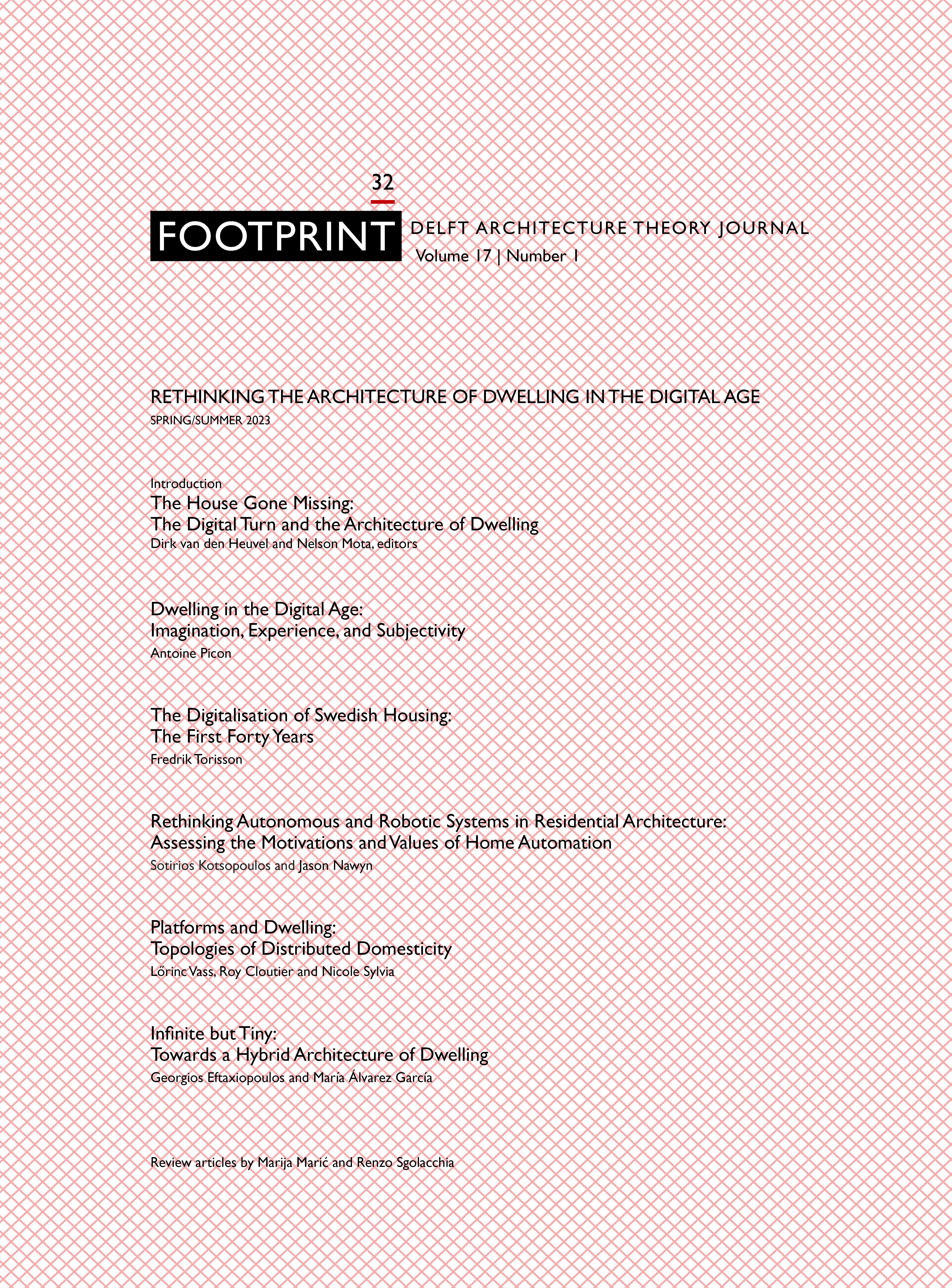The House Gone Missing
The Digital Turn and the Architecture of Dwelling
DOI:
https://doi.org/10.7480/footprint.17.1.7099Abstract
The digital turn in architecture seems to have displaced the house as a paradigm for architectural theory. Omitting the house, and with it, housing and dwelling as key sites for the reconstitution of the discipline, recent theorisations of the digital in architecture have almost exclusively focused on new methods of production and notions of materiality alongside profound changes to the urban and social dimensions of the built environment. The Covid-19 pandemic has unveiled the multifaceted dimensions of the impact of the new digital technologies on dwelling as private houses transformed into online workspaces. It calls for a reflection on the question of dwelling as formulated by Martin Heidegger in 1951, when he suggested that answers won’t be found in technology and quantitative approaches to the pressing housing urgency of the time, but rather in a rethinking of culture through existentialist philosophy. The question of dwelling after the digital turn leads to scrutiny of the history of the digitisation of the house and the shifting nature of domesticity, and to an exploration of involved motivations and values, oscillating between a techno-utopianism to a techno-capitalism. While the boundaries between real and virtual realms are blurred, the house and dwelling find a reconceptualisation in ecological and relational terms, thereby dissolving the house as a discrete object or entity. Privacy, autonomy, and physicality are in need of a rebalancing.
References
Bensi, Negar Sanaan, and Francesco Marullo. ‘The Architecture of Logistics: Trajectories Across the Dismembered Body of the Metropolis’. Footprint 12, no. 2 (2018): 1–5.
Carpo, Mario, ed. The Digital Turn in Architecture 1992 - 2012. 1st edition. Chichester: Wiley, 2012.
———. The Second Digital Turn: Design Beyond Intelligence. The MIT Press, 2017.
Castells, Manuel. The Informational City: Economic Restructuring and Urban Development. First Edition. Oxford: Wiley-Blackwell, 1992.
Collins, Peter. Changing Ideas in Modern Architecture 1750-1950. 1st edition. Faber & Faber, 1965.
Colomina, Beatriz. ‘Couplings’. OASE - Journal for Architecture, no. 51 (1999): 20–33.
Heidegger, Martin. ‘Building Dwelling Thinking’. In Poetry, Language, Thought, translated by Albert Hofstadter, 145–61. New York: Harper & Row, 1971.
Jenkins, Fiona, and Julie Smith. ‘Work-from-Home during COVID-19: Accounting for the Care Economy to Build Back Better’. The Economic and Labour Relations Review 32, no. 1 (1 March 2021): 22–38. https://doi.org/10.1177/1035304620983608.
Leach, Neil. ‘The Dark Side of the Domus’. The Journal of Architecture 3, no. 1 (1998): 31–42.
Picon, Antoine. Digital Culture in Architecture: An Introduction for the Design Professions. Birkhäuser Basel, 2010.
———. Smart Cities: A Spatialised Intelligence. Chichester: Wiley, 2015.
———. The Materiality of Architecture. Minneapolis, London: University of Minnesota Press, 2021.
Riley, Terence. The Un-Private House. New York: Museum of Modern Art, 1999.
Downloads
Published
Issue
Section
License
Copyright (c) 2023 Dirk van den Heuvel, Nelson Mota

This work is licensed under a Creative Commons Attribution 4.0 International License.
- Authors retain copyright and grant the journal right of first publication with the work simultaneously licensed under a Creative Commons Attribution License that allows others to share the work with an acknowledgement of the work's authorship and initial publication in this journal.
- Authors are able to enter into separate, additional contractual arrangements for the non-exclusive distribution of the journal's published version of the work (e.g., post it to an institutional repository or publish it in a book), with an acknowledgement of its initial publication in this journal.





